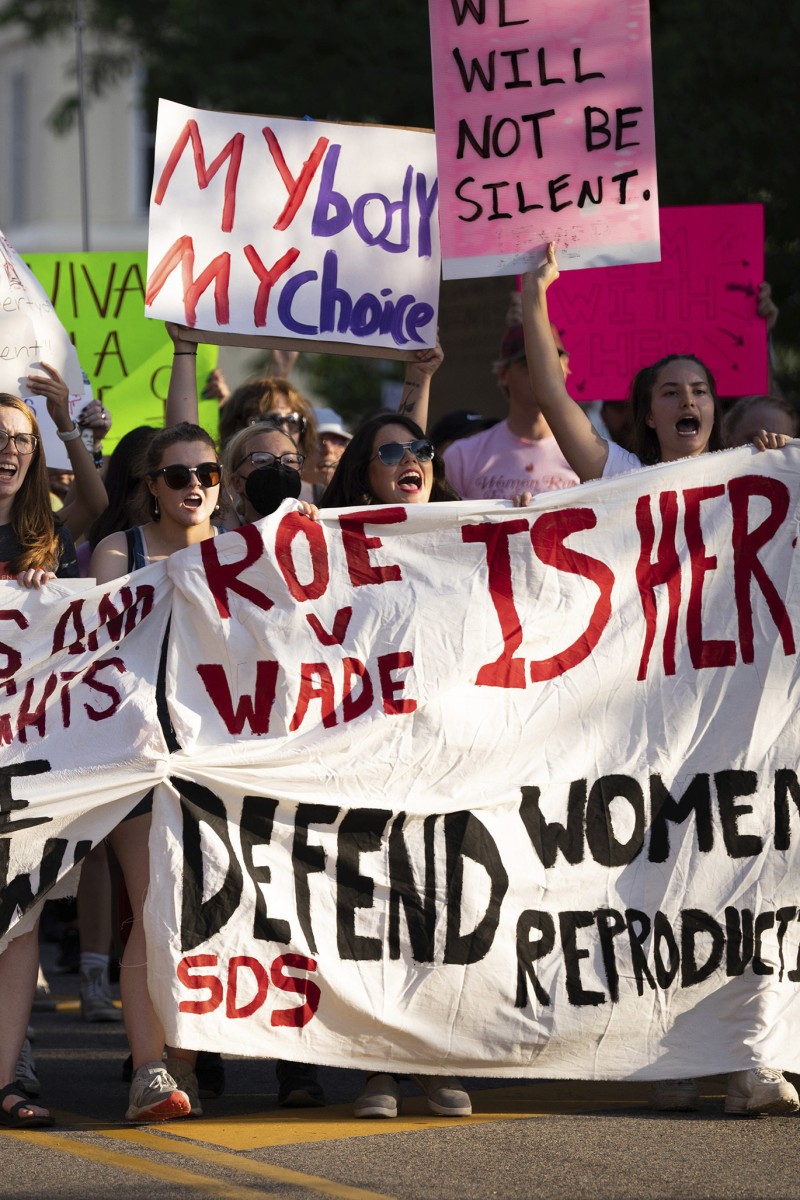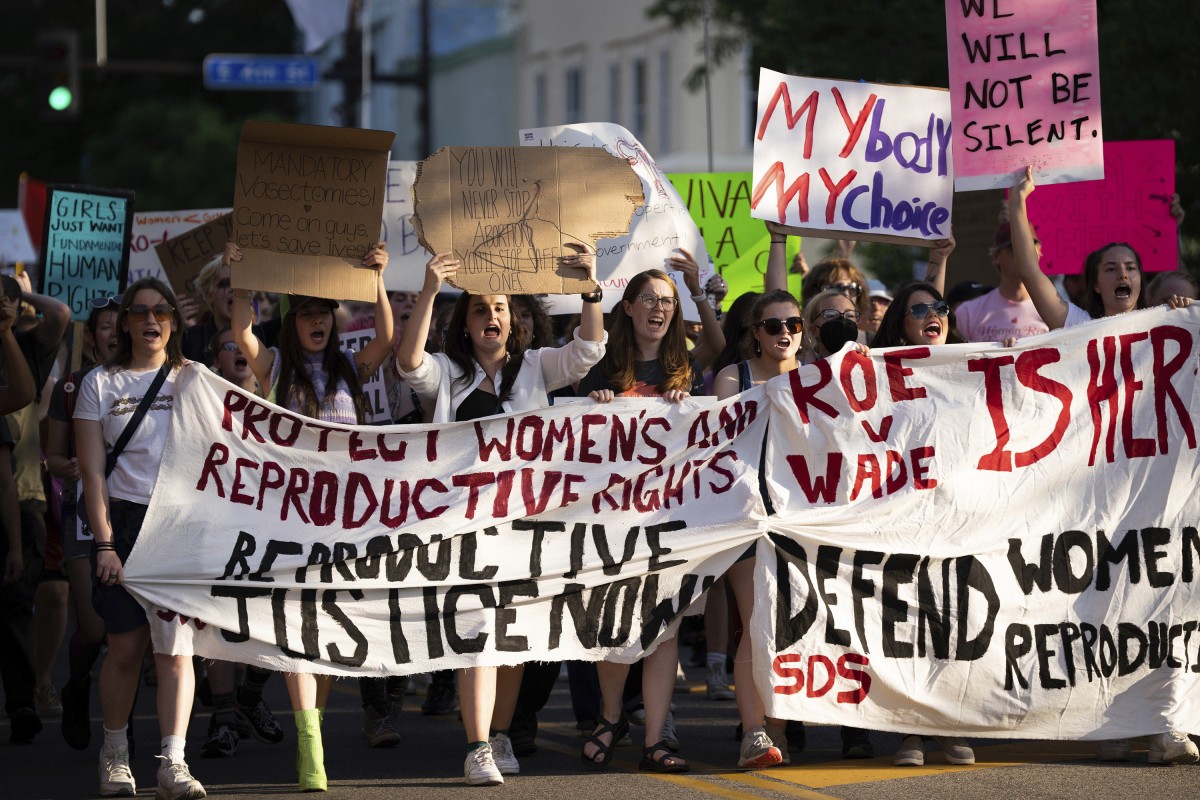
- Landmark Supreme Court decision that guaranteed an American’s right to an abortion was scrapped in June 2022, leading to protests
- Many are worried about the future of reproductive rights, as well as access to contraception and marriage rights for same-sex couples
.jpg?itok=_cV7J0oe)
 A crowd takes part in a student-led protest in Minneapolis, Minnesota, after the Supreme Court overruled Roe v Wade on Friday, June 24, 2022. Photo: AP
A crowd takes part in a student-led protest in Minneapolis, Minnesota, after the Supreme Court overruled Roe v Wade on Friday, June 24, 2022. Photo: APRoe v. Wade, the landmark 1973 Supreme Court decision that guaranteed an American’s right to abortion nationwide, has been overturned as of June 2022.
The Supreme Court voted 5-4 to overturn the decision, with conservative justices voting in favour, and liberal ones voting against, with the exception of Chief Justice John Roberts.
This highly controversial ruling has sparked discussion and debate worldwide. Here’s what you need to know about the Supreme Court decision, its history, and what it could mean for reproductive rights worldwide.
First off: What is Roe v. Wade?
Here’s a brief summary from the BBC:
In 1969, a 25-year-old single woman, Norma McCorvey using the pseudonym “Jane Roe”, challenged the criminal abortion laws in Texas. The state forbade abortion and called it unconstitutional, except in cases where the mother’s life was in danger.
Before 1973, states could decide whether abortion was legal. In 30 states, the procedure was completely prohibited, and in 16 states, it was illegal, but some exceptions were made, such as in the case of rape, incest or to protect the health of the mother.
Defending the anti-abortion law was Henry Wade – the district attorney for Dallas County – hence Roe v Wade.
Sex education in Hong Kong: Things you need to know, but were too afraid to ask
McCorvey was pregnant with her third child when she filed the case, and claimed that she had been raped and wanted to get an abortion. But the case was rejected and she was forced to give birth.
She appealed the case – meaning she asked for it to be judged again, by a higher court. In 1973 her appeal made it to the US Supreme Court, where her case was heard alongside that of a 20-year-old Georgia woman, Sandra Bensing.
They argued that abortion laws in Texas and Georgia went against the US Constitution because they infringed on a woman’s right to privacy.
The justices agreed with them. By a vote of seven to two, the justices ruled that a woman’s right to terminate her pregnancy was protected by the US constitution.
What is the Supreme Court?
The Supreme Court is the highest in the land, and they have final say on a court case. When a judge is appointed to the Court, they hold the position for life, or until they decide to retire.
What happened this year, and what does it mean?
On June 24, 2022, the Supreme Court overruled Roe v. Wade, meaning that the right to an abortion was no longer protected by the US constitution and available nationwide.
This essentially means that each state has the right to make its own reproductive laws regarding abortion. As of right now, the procedure is banned or heavily restricted in 16 states, and access is threatened in 11 states, which are considering partial or full bans.
Help! I want to learn more about sex, but it feels off-limits and I’m not sure where to go
Currently, women are still able to travel to places where abortion is legal to have the procedure. Brett Kavanaugh, a conservative judge who voted to overturn Roe, wrote in an opinion released with the ruling that states may not ban women who travel to get an abortion “based on the constitutional right to interstate travel.”
Still, many states, such as South Dakota, have been pushing legislation that would ban women from travelling for the procedure, so the future remains undetermined.
What does this mean for reproductive rights globally?
Since politics in the US often sets a precedent for other democracies globally, the overturning of Roe v. Wade could shift worldwide thoughts on female reproductive rights and deter governments in various countries from increasing protections for women.
Licha Nyiendo, chief legal officer of the group Human Rights First, wrote that overturning Roe would be a “step in a very dangerous direction for everyone in the United States and a frightening signal to authoritarians around the world that they can strip long-established rights from their countries’ people.”
Hong Kong students don’t receive adequate sex education, survey reports
How will overturning Roe v. Wade affect other rights in the US?
A big concern about overturning Roe is how it could set a precedent for the Supreme Court to overturn other landmark cases, such as Griswold v. Connecticut in 1965, which protects the use of and access to contraceptives, and Obergefell v. Hodges in 2015, which granted federal marriage rights to same-sex couples.
These fears aren’t without merit; Justice Clarence Thomas wrote in a statement following the Roe ruling that the judgments on these cases “were demonstrably erroneous decisions.”
What happens if a woman has an abortion in a state where it is banned?
As of right now, there are no laws that punish women if they obtain an abortion illegally – meaning if they have the procedure in a state where it is not allowed, often through dangerous means. However, there are heavy punishments for people who provide abortions. For example, in the state of Louisiana, illegal abortion providers could be punished with up to 15 years in prison and receive a hefty fine.
Nevertheless, there are still “abortion abolitionists”, such as pastor Jeff Durbin of the Apologia Church. Durbin recently pushed for a bill in Louisiana that would criminalise women who receive the procedure and treat it the same as homicide. Although his attempt failed, people like Durbin have had their voices amplified since Roe v. Wade was overturned, and the future is once again uncertain for women.
What is being done to help women who need abortions but live in states where it is banned?
According to the Pew Research Center, as of 2022, 63 per cent of women and 58 per cent of men in America support the right to abortion, making most Americans pro-choice.
There are many non-profits and organisations dedicated to helping people access the procedure and supporting their reproductive rights. Following the decision, many abortion advocacy funds in states where the procedure was not protected froze their operations until they could determine what effect the ruling – and the subsequent laws that states would pass – would have on them.
That being said, according to Lucinda M Finley, a professor of Appellate Advocacy at the University of Buffalo, donating to abortion funds is legal, even in places where the procedure is outlawed.
There are a multitude of abortion funds and non-profits in the US that one can donate to, the most well-known being Planned Parenthood, where Mackenzie Scott, ex-wife of Jeff Bezos, recently donated US$275 million.
.jpg?itok=_cV7J0oe)